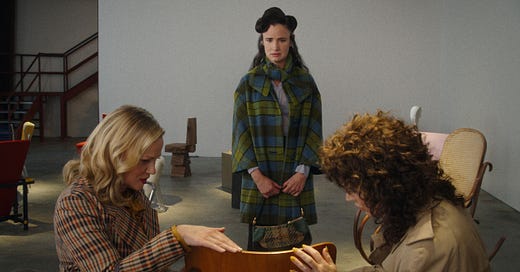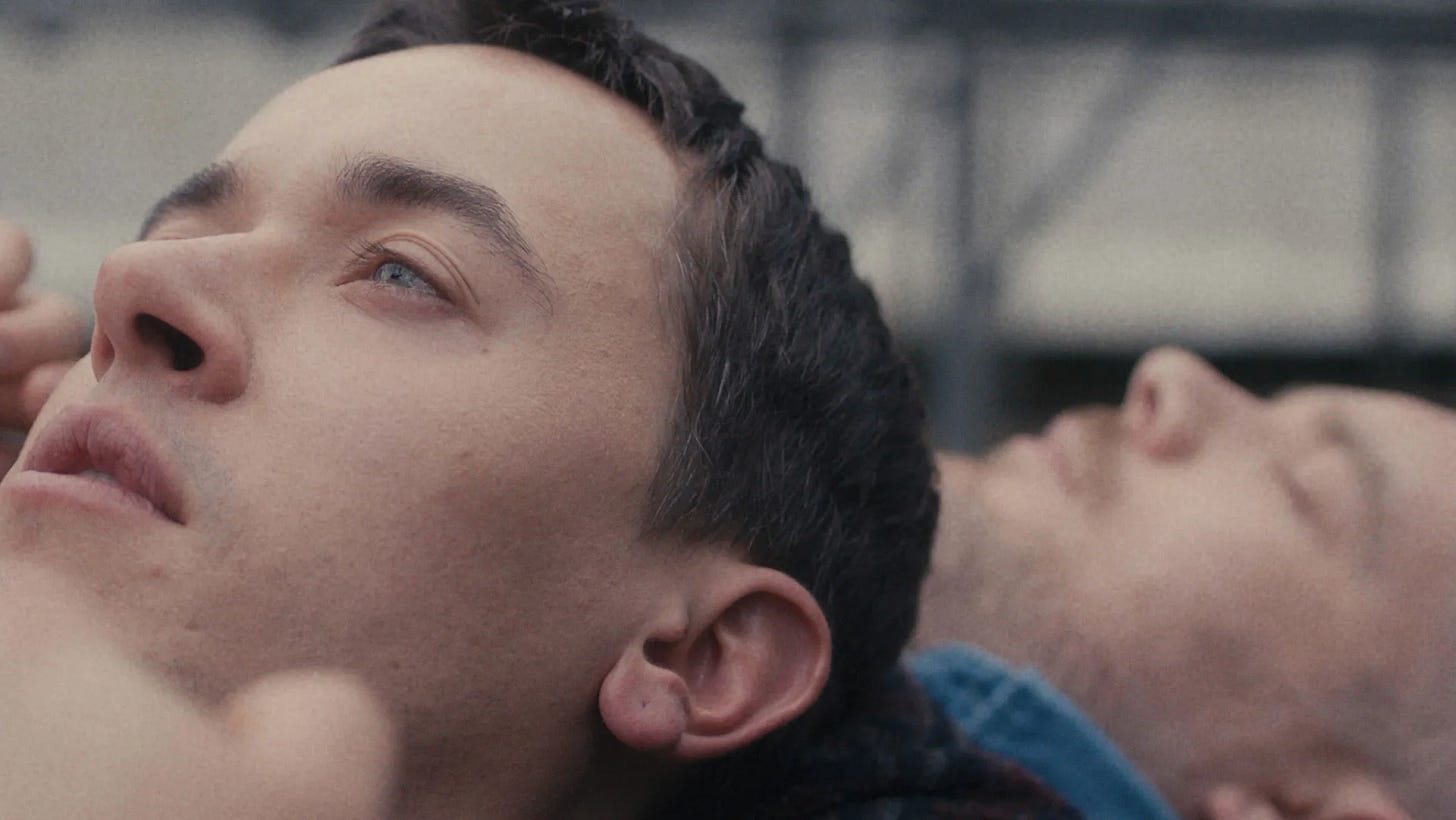By Design (2025)
Sometime in the last three years the Instagram algorithm decided that what I really want is to learn about the history of furniture. So despite the diminishing returns of Instascrolling I’m at least occasionally edified by the pet project of two Cornell architecture school buddies who explicate the design of iconic household objects for the masses. It turns out you can say a lot about a chair, for example:
The cost of attending the Sundance Film Festival from home has been rising steeply ever since the fest introduced online screenings in 2021. Since tickets go on sale before any tea has been spilt about the lineup, you pretty much have to choose films at random using only the programmer’s notes to try to sniff out quality. Amanda Kramer’s By Design benefitted from having a great copywriter, who came up with the enticing log line, “A woman swaps bodies with a chair, and everyone likes her better as a chair.” Well, I fell for it.
Nothing about By Design works. The acting is unpleasant, even more irritating than the occasional dance interludes. We’re supposed to believe that the signature chair Juliette Lewis’s character falls for at a seating showroom would turn heads, but I don’t buy it and the movie isn’t going to any great lengths to sell it to me either. If you’ve ever wanted Melanie Griffith to narrate your life you might reconsider after hearing her voiceover work here, a grating echo of Joanna Newsom’s charming work on Inherent Vice. Not even a last-minute Udo Kier guest appearance can save things, which is how you really know you’re in trouble.
Amid our ongoing discussions about just how far a little money can get you in the hands of a director who knows what to do with it,1 here’s a movie where you can tell exactly how little money it was made for (pejorative). Worse than the threadbare images is the poverty of ideas on offer. Any resemblance By Design has to a film with something smart to say about commodity fetishism, let alone one that even knows what that means, is purely coincidental. I think I’ll stick with the little furniture nerds in my phone, who at least have taught me a bit about the labor that goes into building the world I live in.
Plainclothes (2025)
Gay cops walk among us; I learned as much in the days when I was on Hinge, where one would pop up every 50 profiles or so. It’s a disturbing fact of life. The first Pride was a riot, I’m reminded every June, the gay and transgender denizens of Greenwich Village fighting back together against police raids in their hangout spots. Nowadays we have dedicated liaison units within metropolitan police departments putatively designed to investigate hate crimes against LGBTQ civilians. Every now and then an officer on such a unit will escape for a bigger and brighter future—just ask an alumnus of the D.C. unit, Trump’s acting secretary of labor.
Compared to other police-curious films I’ve seen and heard about at Sundance, Carmen Emmi’s Plainclothes isn’t going to win any awards from the Verso set2 for criticizing, dissecting, or otherwise blowing apart our illusions about policing. For that matter, Emmi isn’t valorizing the profession either, so it all kind of comes out in the wash. Lucas (Tom Blyth) is a young cop in Syracuse in the 90s, assigned to a sting operation for catching men (invariably the queer kind) in the act of public indecency. Lucas is married to a woman and deeply in the closet, so when he has a heart-stopping encounter with the strapping Andrew3 (Russell Tovey) on the job, he has to start playing four-dimensional chess to find a way to see him again…and again…and again…
Formally there’s too much going on in Plainclothes, which feels like a function of its first-time filmmaker trying to get as many of his ideas out there as possible, lest he can’t get a second movie funded. We’re talking changing aspect ratios, multiple film formats, chronological shifts signified by waxing and waning facial hair. In spite of all that, there’s something compelling going on with this movie. It’s to Emmi’s great credit that he not only assembles a strong cast of professional and unsung actors (Maria Dizzia knocks it out of the park as Lucas’s lightly strung-out mother), but that he also knows how to direct them. The whole cast gels in a way that felt unusual for a Sundance debut, and—it shocks me to say this—I seriously would have watched another half hour4 to see more of the character drama play out. I wouldn’t be surprised if Emmi took his instincts to television to experiment with longform queer worldbuilding. Hopefully he’d find something with a bit more critical substance to say about that world while he’s there.
One of the few hat tips I will give to The Brutalist, not to keep bringing that movie back up in passing.
If the Verso set were in the habit of giving out awards to movies. That sounds terrible actually and I hope I’m not giving any of them any ideas.
Who we later learn works at a church. R.I.P. Michel Foucault, you would have loved this movie.
Plainclothes clocks in at 95 minutes, a rare instance where I wouldn’t necessarily consider the short runtime a virtue.





